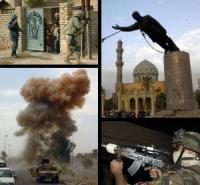Home | Military Conflict | Iraq War
|
|
|
Prior to the invasion, the governments of the United States and the United Kingdom asserted that the possibility of Iraq employing weapons of mass destruction (WMD) threatened their security and that of their coalition/regional allies. In 2002, the United Nations Security Council passed Resolution 1441 which called for Iraq to completely cooperate with UN weapon inspectors to verify that it was not in possession of weapons of mass destruction and cruise missiles. The United Nations Monitoring, Verification and Inspection Commission (UNMOVIC) was given access by Iraq under provisions of the UN resolution but found no evidence of weapons of mass destruction. Additional months of inspection to conclusively verify Iraq's compliance with the UN disarmament requirements were not undertaken. Head weapons inspector Hans Blix advised the UN Security Council that while Iraq's cooperation was "active", it was not "unconditional" not "immediate". Iraq's declarations with regards to weapons of mass destruction could not be verified at the time, but unresolved tasks concerning Iraq's disarmment could be completed in "not years, not weeks, but months". Following the invasion, the U.S.-led Iraq Survey Group concluded that Iraq had ended its nuclear, chemical, and biological programs in 1991 and had no active programs at the time of the invasion but that Iraq intended to resume production once sanctions were lifted. Although some degraded remnants of misplaced or abandoned chemical weapons from before 1991 were found, they were not the weapons which had been the main argument to justify the invasion. Some U.S. officials also accused Iraqi President Saddam Hussein of harboring and supporting al-Qaeda, but no evidence of a meaningful connection was ever found. Other reasons for the invasion included Iraq's financial support for the families of Palestinian suicide bombers, Iraqi government human rights abuse, and an effort to spread democracy to the country. The invasion of Iraq led to an occupation and the eventual capture of President Hussein, who was later tried in an Iraqi court of law and executed by the new Iraqi government. Violence against coalition forces and among various sectarian groups soon led to the Iraqi insurgency, strife between many Sunni and Shia Iraqi groups, and the emergence of a new faction of al-Qaeda in Iraq. In 2008, the UNHCR reported an estimate of 4.7 million refugees (~16% of the population) with 2 million abroad (a number close to CIA projections) and 2.7 million internally displaced people. In 2007, Iraq's anti-corruption board reported that 35% of Iraqi children, or about five million children, were orphans. The Red Cross stated in March 2008 that Iraq's humanitarian situation remained among the most critical in the world, with millions of Iraqis forced to rely on insufficient and poor-quality water sources. In June 2008, U.S. Department of Defense officials claimed security and economic indicators began to show signs of improvement in what they hailed as significant and fragile gains. In 2007, Iraq was second on the Failed States Index; though its ranking has steadily improved since then, moving to fifth on the 2008 list, sixth in 2009, and seventh in 2010. As public opinion favoring troop withdrawals increased and as Iraqi forces began to take responsibility for security, member nations of the Coalition withdrew their forces. In late 2008, the U.S. and Iraqi governments approved a Status of Forces Agreement effective through January 1, 2012. The Iraqi Parliament also ratified a Strategic Framework Agreement with the U.S., aimed at ensuring cooperation in constitutional rights, threat deterrence, education, energy development, and other areas. In late February 2009, newly elected U.S. President Barack Obama announced an 18-month withdrawal window for combat forces, with approximately 50,000 troops remaining in the country "to advise and train Iraqi security forces and to provide intelligence and surveillance". General Ray Odierno, the top U.S. military commander in Iraq, said he believes all U.S. troops will be out of the country by the end of 2011, while UK forces ended combat operations on April 30, 2009. Iraqi Prime Minister Nouri al-Maliki has said he supports the accelerated pullout of U.S. forces. In a speech at the Oval Office on 31 August 2010 Obama declared "the American combat mission in Iraq has ended. Operation Iraqi Freedom is over, and the Iraqi people now have lead responsibility for the security of their country." Beginning September 1, 2010, the American operational name for its involvement in Iraq changed from "Operation Iraqi Freedom" to "Operation New Dawn." The remaining 50,000 U.S. troops are now designated as "advise and assist brigades" assigned to non-combat operations while retaining the ability to revert to combat operations as necessary. Two combat aviation brigades also remain in Iraq. |




 RSS
RSS